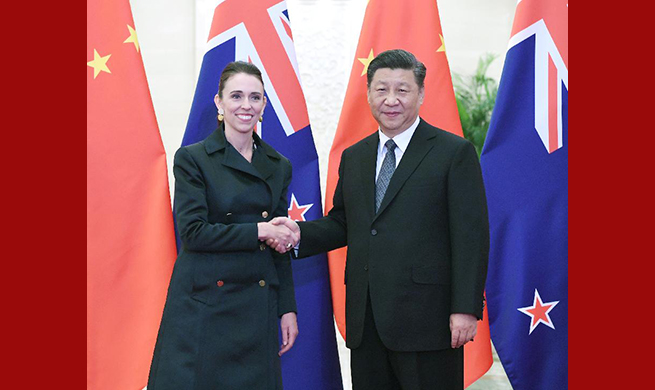LONDON, April 1 (Xinhua) -- Although it was hard to foresee the exact impact of Brexit on the job market in Britain due to the uncertainties, certain sectors that rely heavily on workers from other European Union countries would face challenges, said Pawel Adrjan, UK economist at Indeed Hiring Lab, in a recent interview with Xinhua.
WEAK ECONOMY, STRONG JOB MARKET
"The surprising thing is that the overall economy is slowing down and investment is also slowing down in Britain, but the job market has not stopped growing," said Adrjan.
Recent figures from the Office for National Statistics (ONS) showed that the number of employed people in Britain has risen again to a new record of 32.7 million between November and January.
Adrjan said one probable reason was the uncertainty and lack of clarity on Brexit.
"Businesses are reluctant to invest in long-term projects due to the uncertainties, and the only way they can meet demand is to continue hiring people, which results in growing employment," said Adrjan.
"The second trend is that it becomes harder and harder for businesses to hire more staff, because there are fewer and fewer people unemployed thanks to the record high employment rate," he added.
Besides, he said, migration flows, especially from EU countries, have slowed down. All three reasons have contributed to the recent employment data.
EU WORKERS NOT REPLACEABLE
"We don't know what form Brexit will take or when it will happen," said Adrjan, "so it is difficult to say how Brexit will exactly impact on the labor market."
But, he said, many sectors in Britain rely more heavily on foreign workers, such as construction, hospitality and agriculture, while other sectors hire high-skilled workers, for example education and finance.
"Brexit would be a problem to those sectors and the (country's) future migration policy would matter a lot," he said.
"One of the challenges is that some sectors, such as the teaching, hospitality and food sectors, have a lot of European workers with fairly low salary," he said. "If those people have to apply for a visa in the future, it means either salaries will go up to meet the visa policy requirements or businesses will have fewer people to hire in those professions."
Britain's future visa policy would be less important for the high-skilled sectors, such as finance and IT, where salaries are much higher and can easily cover the costs of visa processing.
While some people argue that those EU workers would be replaced by people from other foreign countries, Adrjan said that not all foreign workers are interchangeable.
"Immigrants from different countries are seeking different jobs, and they are not exactly replaceable," he said.
According to recent data from Indeed Hiring Lab, the jobs most popular among EU citizens are not the same as those among non-EU job seekers.
Some people also argue that, after Brexit, employers who are unable to find EU workers should try to hire people from the UK, because even if the employment rate is record high there are still people looking for jobs in Britain.
But, Adrjan explained, those unemployed people might need more flexible schedules or more training, which will cost more for the employers.
And yet, he still believed this might be an optional strategy for employers after Brexit.
FOCUS ON TRAINING
"Over the last three years, the overall interest of overseas job seekers in finding employment in Britain has fallen," Adrjan stressed.
He noted that, since the Brexit referendum, the British pound has depreciated, which made jobs in the UK less attractive to foreign job seekers.
"Should no-deal Brexit happen, it would affect the economy and the pound negatively," he said.
What's worse, some sectors in Britain, such as nursery and IT, are already facing a shortage of skilled workers.
"They should focus on training or reforming the education system," said Adrjan, "but, unfortunately, some long-term issues, such as skills training, innovation and infrastructure, are pushed back on the agenda as a result of Brexit."
Indeed, job seekers from countries like France, Spain and Italy are still willing to come to Britain after the Brexit referendum despite the falling pound and other negative effects. According to Adrjan, it is because labor markets in those countries are not as strong as in Britain since the last recession.
However, he also noted that the salary gap between Britain and other EU countries like Poland was narrowing, which would also make jobs in Britain less attractive in the future.
Furthermore, pay growth was not really picking up in Britain.
"Wages are growing but purchasing power is still lower than it was before the financial crisis," said Adrjan. "Part of the reason is that productivity growth in Britain is recovering more slowly than in other countries, such as in Germany."













